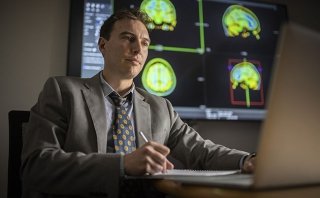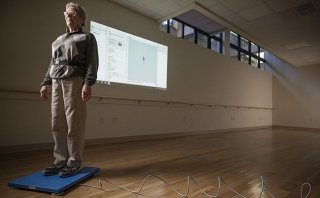
Davide Balos Cappon, MS, PhD
- Assistant Scientist I
- Clinical Neuropsychologist, The Deanna & Sidney Wolk Center for Memory Health, Hebrew SeniorLife
- Assistant Professor of Neurology, Harvard Medical School and Beth Israel Deaconess Medical Center
- Faculty
Davide Balos Cappon, MS, PhD is an Assistant Scientist at the Hinda and Arthur Marcus Institute for Aging Research, an Assistant Professor of Neurology at Harvard Medical School, and a practicing board-certified clinical neuropsychologist at the Deanna and Sidney Wolk Center for Memory Health at Hebrew SeniorLife.
As a clinician-scientist, Dr. Cappon has a multidisciplinary background with specific training and expertise in clinical translational research involving device-based neuromodulation techniques such as transcranial magnetic stimulation (TMS) and transcranial electrical stimulation (tES). He has conducted numerous studies examining the mechanisms, safety, and efficacy of these novel noninvasive therapeutic approaches to improve psychiatric symptoms and cognitive functions in aging and neurodegenerative diseases.
A major focus of Dr. Cappon’s research is on making precise symptom-specific circuit-based neuromodulation therapy more accessible to older adults with cognitive and mood disorders. He has developed novel methods and procedures for the safe, remotely monitored, multi-channel application of tES to older adults in their homes (HB-tES). Dr. Cappon is also investigating the use of a personalized novel and scalable home-based neuromodulation interventions that address the undertreatment of depression and other psychiatric symptoms in the context of dementia.
At Hebrew SeniorLife, another central theme of Dr. Cappon's research is preserving and lengthening healthy aging across the lifespan. Serving on the executive committee of the organization’s Healthy Aging Initiative and in collaboration with investigators from the Marcus Institute, Dr. Cappon is working on expanding our understanding of multimodal factors determining lifelong health. The initiative will identify physical and mental health markers across the lifespan and promote multimodal interventions that support health and prevent age-related cognitive decline, adopting a whole-person approach to health, aging, and well-being.
Prior to coming to Hebrew SeniorLife, Dr. Cappon worked at the functional neurosurgery unit at the National Hospital of Neurology and Neurosurgery in London UK and has been engaged in translational research at Harvard Medical School since January 2018, where he has completed Fellowships in Neuromodulation in dementia at the Berenson Allen Center-Beth Israel Deaconess Medical Center and in geriatric neuropsychiatry at the Marcus Institute. He is also on the faculty of the CME course in Transcranial Electrical Stimulation for Neuropsychiatric Applications at Harvard Medical School.
Preserving and lengthening healthy aging across the lifespan. This research line expands our understanding of multimodal factors determining lifelong health. The initiative will identify lifestyle, physical and mental health markers across the lifespan and promote multimodal interventions that support health and prevent age-related cognitive decline, adopting a whole-person approach to health, aging, and well-being.
Increase the access to neuromodulation interventions by remotely supervised, caregiver-led, home-based transcranial electric stimulation (HB-tES). My laboratory has developed a novel method and curriculum for remotely supervised, caregiver-led, home-based tES (HB-tES), specifically optimizing its use for older adults. This novel HB-tES approach makes it possible to better integrate tES interventions into the daily lives of participants and caregivers. Participants can gain access to HB-tES irrespective of whether they live close or far away from laboratory and clinical facilities; thus, this approach promises to prevent geographical selection bias and promote diversity in treatment samples.
Advances and optimizations in the use of neuromodulation interventions to drive better patient outcomes. My laboratory is leading the execution and scientific development of clinical interventional trials to increase the knowledge about the mechanisms of action, safety, and efficacy of neuromodulation technologies such as transcranial magnetic stimulation (TMS), transcranial electric stimulation (tES) and deep brain stimulation (DBS). Specifically, by combining behavioral assessment with neurophysiologic and neuroimaging methods, we are examining the optimization of neuromodulation technologies to improve psychiatric symptoms (e.g., major depressive disorder) and cognitive functions (e.g., memory) in aging and neurodegenerative diseases.
Early detection of cognitive decline using cutting-edge technologies. Early detection of cognitive decline is linked to several advantages; for example, it might encourage the implementation of lifestyle modifications or interventions at a time when they may be most helpful. My lab is interested in exploring cutting-edge methods for the early detection of age-related cognitive decline, such as using mobile apps in devices such as smartphones and tablets.
Developing behavioral interventions that slow decline associated with neurologic disease and promote optimal brain health. This research line examines the use of novel person-centered multidomain behavioral interventions to maintain or improve a person's cognitive performance, allow them to carry out their usual daily activities, and/or address behavioral symptoms that frequently accompany cognitive impairment.
Understanding the neurocognitive and neurophysiological predictors of adherence to cognitive and physical exercise. This research line advances our understanding of the neurophysiological and neurocognitive predictors of adherence to physical and cognitive exercise programs. Identifying these markers will help develop tailored exercise programs that sustain cognition in healthy older adults and delay dementia in older adults with mild cognitive impairment.







